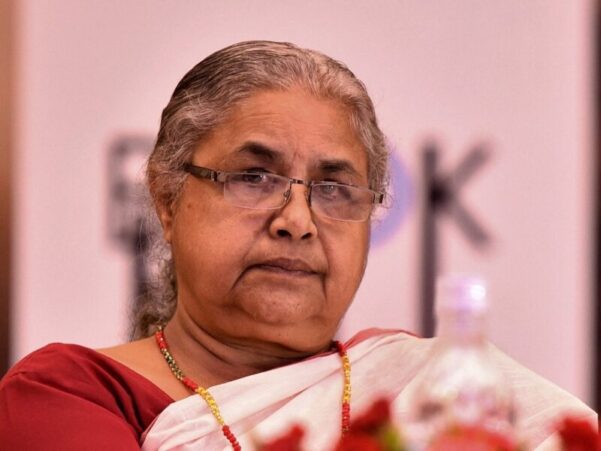
Nepal has entered a new political chapter after the Gen-Z movement led to significant change. Former Chief Justice Sushila Karki has been sworn in as the interim Prime Minister. This appointment marks a historic moment, as she becomes the first woman to hold the top executive position in Nepal. The development has attracted regional and international attention, with Indian Prime Minister Narendra Modi congratulating her through social media. India has also reiterated its commitment to Nepal’s stability, peace, and prosperity.
Historic Oath Ceremony in Kathmandu
On Friday night, at around 9 pm, Sushila Karki took the oath of office. The ceremony was administered by the President of Nepal in Kathmandu. This marked the formal beginning of Nepal’s interim government, which will function until the next general elections scheduled in 2026. Karki’s appointment is widely viewed as a symbol of hope for transparency and clean governance in Nepal, a nation that has often struggled with political instability and corruption.
Her swearing-in was witnessed by several dignitaries and officials who highlighted the importance of this transitional phase. Political analysts in Nepal described the moment as a turning point for the country’s democracy. The oath-taking event was also covered extensively by regional and international media, given its symbolic importance in South Asian politics.
Prime Minister Narendra Modi’s Message
Indian Prime Minister Narendra Modi reacted swiftly to the political development in Nepal. In a message shared on social media platform X, Modi congratulated Sushila Karki on assuming charge as the interim Prime Minister of Nepal. He extended his best wishes for her tenure and reaffirmed India’s continued support to the people of Nepal.
In his post, Modi expressed confidence in Nepal’s progress under Karki’s leadership. He stated that India remains firmly committed to the peace, progress, and prosperity of Nepal and its citizens. This message reflects India’s broader foreign policy approach towards Nepal, emphasizing partnership, cooperation, and regional stability.
Diplomatic observers noted that Modi’s warm message signals India’s intention to maintain strong bilateral ties with Nepal during this transitional phase. The Indian government has always considered Nepal not only a neighbor but also a cultural and historical partner bound by deep people-to-people relations.
Foreign Ministry Statement from India
Following Karki’s appointment, the Indian Ministry of External Affairs also released an official statement. The ministry highlighted the importance of India’s relationship with Nepal, describing it as a close neighbor, a democratic partner, and a long-term development ally. The statement emphasized that India will continue to work closely with Nepal for the well-being of both nations and their citizens.
The ministry underlined that political developments in Nepal are closely watched in India due to their impact on regional stability. It further mentioned that India will support Nepal’s democratic process and cooperate on issues of development, trade, and cultural exchange. Such diplomatic communication highlights the importance of the Nepal-India relationship, which has remained significant for decades due to geography, economy, and shared history.
Nepal’s Upcoming Elections in 2026
The interim government led by Sushila Karki will guide Nepal until the general elections scheduled for March 5, 2026. These elections will be crucial for determining the long-term political direction of the country. Political experts believe that the success or failure of the interim government will influence the outcome of the elections.
The Gen-Z movement, which played a key role in bringing about this interim change, reflects the rising influence of young citizens in Nepalese politics. The youth of Nepal are demanding accountability, transparency, and modern governance practices. The upcoming elections will likely focus on these themes, with corruption-free governance being a top concern for voters.
First Woman Interim Prime Minister of Nepal
Sushila Karki’s rise to the position of interim Prime Minister is historic in many ways. She has become the first woman to hold the post of Nepal’s executive head. This achievement represents a significant step forward in gender equality and women’s empowerment in South Asia.
Karki has had a distinguished career as the Chief Justice of Nepal, where she was known for her strong stance on anti-corruption and judicial independence. Her leadership in the judiciary built her reputation as a fearless and principled figure. Many citizens now see her as a leader who can bring integrity to the highest office.
Civil society activists in Nepal welcomed her appointment, expressing hope that she will prioritize good governance and fairness. Women’s rights groups also celebrated the moment, calling it a milestone in Nepal’s history. Karki’s leadership is seen as a breakthrough that could inspire more women to participate actively in politics and public life.
Symbol of Hope for Anti-Corruption Movement
Nepal has faced repeated challenges from corruption and weak governance over the years. Successive governments have often been criticized for inefficiency and lack of accountability. This has led to growing public frustration, especially among the younger generation.
Sushila Karki’s appointment is being interpreted as a response to these frustrations. Her image as an upright leader offers hope to millions of Nepali citizens who are seeking a government free from corruption. The Gen-Z movement’s demand for systemic change aligns closely with her reputation for integrity.
Experts believe that if Karki succeeds in setting the right direction during her interim tenure, it could redefine Nepal’s political culture. A corruption-free administration is expected to boost foreign investment, strengthen democracy, and improve public services.
India-Nepal Relations Under the New Leadership
The India-Nepal relationship has always been multifaceted, shaped by cultural ties, economic exchanges, and geopolitical considerations. With Sushila Karki taking charge, many analysts are keen to see how bilateral relations progress.
India has consistently supported Nepal during times of political transition. From humanitarian aid to developmental projects, India has been a strong partner. Under Karki’s leadership, observers expect both nations to enhance cooperation in areas such as trade, energy, infrastructure, and tourism.
Indian officials have stressed that a stable and democratic Nepal is in the best interest of the entire region. Therefore, the interim government will likely maintain active engagement with New Delhi.
Challenges Ahead for the Interim Government
Despite the optimism surrounding Karki’s appointment, the road ahead will not be easy. The interim government faces the immediate challenge of maintaining stability until the 2026 elections. It must also address pressing economic issues, unemployment, and demands for transparency.
Public expectations are high, especially from the younger population who initiated the Gen-Z movement. Failure to deliver meaningful reforms could damage public trust. On the other hand, visible progress in governance and anti-corruption efforts would strengthen democratic institutions and set the stage for a successful election.
Another challenge lies in balancing international relations, particularly with India and China. Nepal’s geopolitical position requires careful diplomacy to ensure national interests are preserved. Karki’s leadership will be tested in managing both domestic pressures and foreign relations.
Symbol of Regional Inspiration
Beyond Nepal’s borders, Sushila Karki’s appointment is being seen as an inspiring development for the South Asian region. Her rise demonstrates how movements led by young people can influence democratic systems. It also shows how women can break barriers and lead nations, even in male-dominated political cultures.
Commentators have suggested that Nepal’s decision to appoint a woman as interim Prime Minister will encourage greater discussions about gender representation in politics across South Asia. It highlights the importance of inclusivity and accountability in governance, which are vital for long-term development.
The coming months will be crucial for Nepal as the interim government begins its work. The leadership of Sushila Karki is expected to provide stability, inspire confidence, and pave the way for a fair electoral process in 2026.
For many citizens, this moment marks not only a political transition but also the beginning of a new hope. A hope for a government that listens to its people, values transparency, and ensures equitable progress. Whether these aspirations turn into reality will depend on the policies and decisions taken by Karki’s interim cabinet.
As Nepal steps into this new phase, the world will be closely observing how the first woman interim Prime Minister shapes the country’s future. The balance between continuity and reform will define her leadership and influence Nepal’s democratic journey in the years to come.


